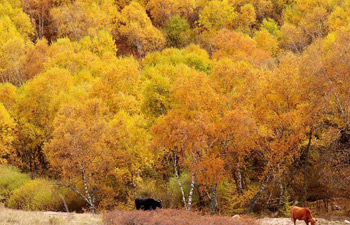WASHINGTON, Oct. 6 (Xinhua) -- About three-quarters of the world's honey is contaminated with neonicotinoids, currently the most widely used class of insecticides worldwide, a new study has found.
However, researchers of the study, published in Friday's issue of the U.S. journal Science, were quick to point out that the concentrations detected are below the amount authorized for human consumption.
Widespread application of neonicotinoids has been identified as a key factor responsible for the global decline in pollinators, particularly bees.
Edward Mitchell of the University of Neuchatel in Switzerland and colleagues tested 198 honey samples from all continents except Antarctica, as well as numerous isolated islands.
They measured the concentrations of five commonly used neonicotinoids: acetamiprid, clothianidin, imidacloprid, thiacloprid, and thiamethoxam.
"Overall, 75 percent of all honey samples contained quantifiable amounts of at least one neonicotinoid," the study wrote.
Of these contaminated samples, 30 percent contained a single neonicotinoid, 45 percent contained two or more, and 10 percent contained four or five, it found.
In addition, multiple contaminations were most frequent in North America, Asia, and Europe and least frequent in South America and Oceania.
"Our results confirm the exposure of bees to neonicotinoids in their food throughout the world," it said.
Chris Connolly, reader in neurobiology at the University of Dundee, who wrote a perspectives article published alongside the research in Science, described the findings as "alarming."
Connolly noted the levels of these chemicals detected in honey "are unlikely to be a hazard to human health" and "also not likely to be lethal to bees."
"However, the levels detected are sufficient to affect bee brain function and may hinder their ability to forage on, and pollinate, our crops and our native plants," he said. "Clearly, the use of neonicotinoids need to be controlled."

















